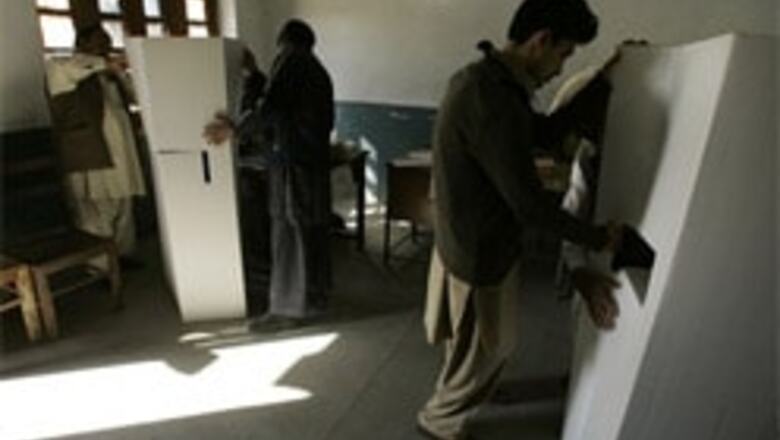
views
Italian politicians in times of political turmoil have been known to call impending elections a "bridge to the unknown". This is an apt metaphor for the nationwide parliamentary vote set to occur in Pakistan on Monday.
Assuming the vote is fair, most observers expect the opposition parties, especially those associated with slain former prime minister Benazir Bhutto and former prime minister Nawaz Sharif, to outpoll the party connected to the increasingly unpopular President Pervez Musharraf.
What comes after that is the mystery, but in any scenario the United States will face more daunting challenges in Pakistan -- especially in pursuing its counterterrorism objectives.
Based on polling and other indicators, the odds favor Bhutto's party coming in first, with Sharif's party second -- trailed by a handful of smaller parties, including those most closely associated with extremist factions.
The opposition parties are likely to be pushed into a fairly broad coalition by the post-election math and a shared opposition to various Musharraf policies -- ranging from his declaration of emergency rule to his dismissal of Supreme Court justices and what many Pakistanis see as an overly-close identification with the United States.
For Washington, the priorities in Pakistan must be to deprive al-Qaeda of the sanctuary it has established along Pakistan's rugged border with Afghanistan and to reverse the momentum the Taliban have achieved in attacks on both sides of the border.
Formidable as these challenges were in the period of Musharraf rule, they will become more so after the election.
Although the parties likely to assume power doubtless feel threatened by extremism, the post-electoral situation will force them to focus time and energy on more elemental things: reestablishing civilian rule after nearly a decade out of power, reversing many of Musharraf's recent actions, perhaps seeking his ouster, sorting out differences among themselves, and dealing with pent-up public frustrations about lack of services and other grievances.
In all of these arenas, a new civilian government will face a more complex landscape than its predecessors.
The country Musharraf took over from the civilians in 1999 was close to a failed state, especially in terms of its international financial standing.
Ironically, in light of Musharraf's huge unpopularity, Pakistan during his rule has attained respectable growth rates and established a generally favorable investment climate.
Along with that has come a growing middle class, a more aggressive media, and a more assertive judiciary. In at least a few respects, Musharraf is a victim of his own success.
Moreover, elected civilian leaders, presumably intent on retaining popular support, will inevitably be more sensitive to public opinion than Musharraf had to be.
PAGE_BREAK
By most measures, public opinion is not supportive of U.S. counterterrorism policies, or at least the manner in which the public perceives them to have been carried out.
It is therefore likely that a new government will be discouraged both by workload and political caution from moving as aggressively on counterterrorism issues as the U.S. would like.
These trends will be balanced to some degree by the other significant actor in post-election Pakistan -- the Pakistani army. The army remains the strongest and most cohesive institution in the country.
Having been itself attacked by extremists on numerous occasions in recent months and having seen more territory along the border come under terrorist sway, the military has no illusions about the threat extremist violence now presents to itself or to the integrity of the Pakistani state.
The army will ensure that the issue is on the national agenda at some level.
But the army is stretched very thin coping with extremist violence that has expanded both in lethality and scope, and it does not yet have counterinsurgency training and capabilities adequate to the challenge.
Although some tensions may develop between the military and a new civilian government over such issues, the highly professional Chief of Army Staff, General Kayani, is likely to respect civilian rule in all circumstances short of widespread anarchy.
While the United States has little choice but to accept and work with a more complex -- and probably more sluggish -- decision-making structure in post-election Pakistan, the problem for Washington and it allies is that the clock is ticking on the terrorist threat.
There can be little doubt that al-Qaeda is using the relative safety of the Pakistani border areas to plan further operations aimed at the West.
The plotters of recently thwarted attacks in the UK, Germany, and Spain had all either trained in Pakistani camps or had connections to Pakistani-based al-Qaeda. al-Qaeda will learn from these failed operations as it continues to plan for attacks against its primary target, the United States. For all of these reasons, the highest priority for the U.S. after the election will have to be ensuring that a new Pakistani government sees the terrorist threat for what it has become: not just a threat to the United States but a fight for the future of Pakistan.
If al-Qaeda and Taliban-related violence continues to expand aggressively beyond the border areas in Pakistan, as seems likely, a new government may not need much convincing.
But it will also be a government trying to find its balance while coping with a more complex set of problems than Pakistan has ever faced.
This will require greater skill, cohesion, and capacity for compromise than Pakistani civilian rulers have been able to demonstrate in the past.




















Comments
0 comment